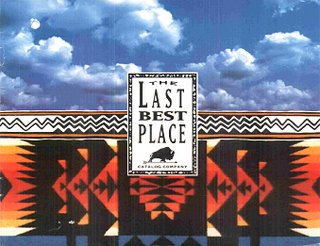4th Circuit Reverses "THE LAST BEST PLACE" District Court Decision, Vindicates PTO
The United States Court of Appeals for the Fourth Circuit has reversed a district court decision regarding THE LAST BEST PLACE mark, ruling that Congress had properly acted to prevent registration of the mark and that the PTO had likewise acted properly in cancelling two registrations and suspending four applications and two oppositions proceedings involving the mark. Last Best Beef, LLC v. Dudas, 84 USPQ2d 1699 (4th Cir. 2007). [The district court's decision is available and was discussed here at the TTABlog.]

Section 206 of the Science, State, Justice, Commerce, and Related Agencies Appropriations Act of 2006 prohibited the use of federal funds to "register, issue, transfer, or enforce any trademark in the phrase 'The Last Best Place.'" [That provision was sponsored by Montana Senator Conrad Burns, who publicly asserted that the mark THE LAST BEST PLACE “belongs to the State of Montana.”] The district court deemed Section 206 a legal nullity because "it contradicted but did not constitute an implied repeal or suspension of the Lanham Act." The court further declared that the PTO had committed "clear error" by complying with Section 206.
Last Best Beef was seeking to register THE LAST BEST PLACE for a variety of products and services. President Bush signed Section 206 into law in November 2005 (and it has been extended through a series of continuing resolutions), and when the PTO (somewhat belatedly) learned of the legislation, it took the aforementioned actions.
Last Best Beef filed suit in February 2006 to challenge the legislation and the PTO's actions. The district court granted summary judgment to Last Best Beef, declaring that Section 206 was "invalid legislation" because it "improperly circumvent[ed]" the Lanham Act. In particular, the district court ruled that Section 206 did not explicitly or implicitly suspend provisions of the Lanham Act. It found the conflict between Section 206 and Section 1052 of the Lanham Act to be "insufficient to demonstrate manifest congressional intent to suspend numerous, interdependent provisions of the Lanham Act with respect to one phrase...."
The Court of Appeals found that the question presented involves an "ordinary question of statutory interpretation that requires us to determine whether or not Congress clearly expressed its intention to repeal through an irreconcilable conflict between Section 206 and Section 1052."
"The conclusion that Congress intended to enact a discrete and narrow exception to the Lanham Act is unavoidable. In fashioning Section 206, Congress simply set forth an exception to the Lanham Act's general rule that trademark registration may not be refused on the basis of the nature of the mark. This is something Congress can do." [Examples are the special legislation for "Smokey Bear," Little League," and the "United States Olympic Committee."]
As to the PTO's actions, its authority "need not derive from Section 206." The authority comes from the PTO's inherent discretion to correct its own errors. The PTO erred in issuing the two registration after Section 206 was enacted, and it had the authority to cancel those erroneously-issued registrations. Suspension of the proceedings and the applications was proper because the legislation prohibited the PTO from "using funds to register any trademarks of the phrase." "It hardly makes sense for the USPTO to conduct administrative hearings on Last Best Beef's applications if registration, at the culmination of those proceedings, is prohibited."
The appellate court therefore reversed the district court judgment and remanded the case to the district court for further proceedings consistent with its ruling.
Text Copyright John L. Welch 2007.




0 Comments:
Post a Comment
<< Home